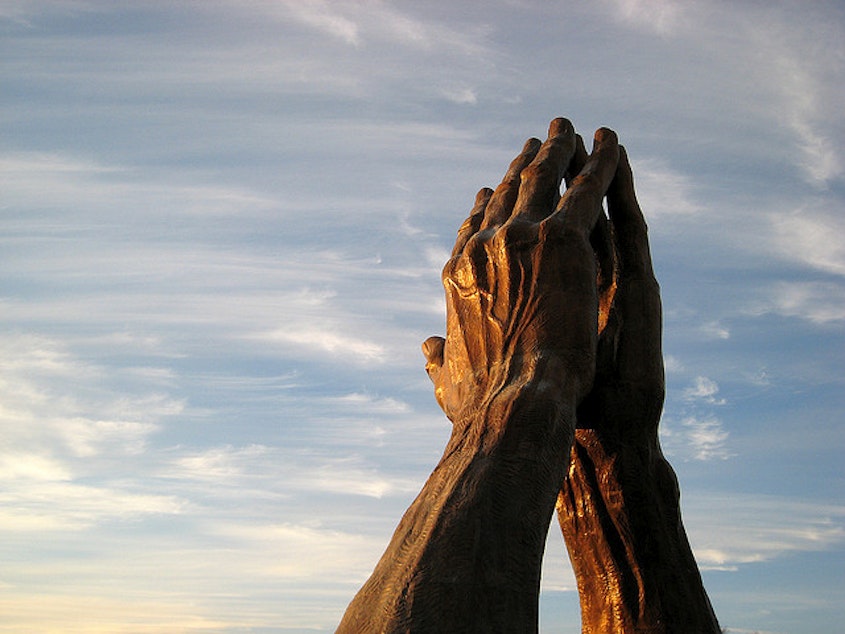'Thoughts and prayers are not enough': Faith in the wake of Sutherland Springs

The massacre in Sutherland Springs last weekend was yet another moment in the painful parade of gun violence in America. This particular tragedy is also part of a long history of violence against religious sanctuaries, dating back to the Civil Rights movement and beyond.
Host Bill Radke sat down with Imam Adam Jamal of MAPS, Rabbi Dan Weiner of Temple De Hirsch Sinai, and Pastor Priscilla Paris-Austin of the Immanuel Lutheran Church. They told him how they plan to address their congregations this weekend, and how, in the face of horror, they find hope.
Weiner said his congregation has a history of activism. Here in Washington, they were involved in the successful push for universal background checks in 2014.
“Thoughts and prayers are not enough,” Weiner said. “We need action.”
Paris-Austin agreed. “When we pray, the response that we hear should drive us to action. To stop at thoughts and prayers is theological abuse.”
She said that toxic masculinity is frequently what fuels these massacres, and that this viewpoint is literally killing us. “What it means to be strong is different for people of faith than what the world wants to purport. In the world, strength is violence. It is power, it is money. A man is considered someone who can hold back his emotions and not express them. But Jesus wept. These are not weak things.”
Jamal is tall and lanky, and jokingly said that to look at him you would not expect him to be an athlete. “But I did judo for a little while, and one thing I took away was that when someone uses their force against you, you have to take it and reverse it against them. Let’s use these events to jumpstart our relationships, but let’s not wait for the next catastrophe, the next mass murder, for us to come together in strength.”
Each of the clergypeople had examples of interfaith outreach when their congregation had suffered at the hands of an assailant. When Weiner’s synagogue was the victim of arson on the night of Yom Kippur, they rescued the Torah from a burning building. The next day, a Lutheran colleague opened his church to them so that morning services could go on.
Jamal described an incident when he was a new imam and his mosque was vandalized with Stars of David. Rather than letting it drive a wedge between faiths, he took the opportunity to call the local rabbi and introduce himself, apologizing for not having been in touch sooner.
There are times, Paris-Austin said, when religious communities can overlook the unthinkable. Dylan Roof was raised in an ECLA church, just like her own. And the Sunday after the Charleston massacre in 2015, she spoke to her congregation about the shooting.
The problem of gun violence is bigger than any one faith, or any single incident. Jamal said that he thinks of humanity as similar to the human body: If one part of the body hurts, then the entire body hurts. And Paris-Austin offered stern rebuke to those who may say the shooting was in any way God’s will.
“It’s not that God allows these things to happen,” Weiner said. “He mourns with us when these things happen.”
With the weight of all this on their shoulders, how can they offer their congregants hope?
Jamal: “Hope is such a big word. And so small. But I think we have to realize that we’re all in this together. The Qur'an repeats twice: 'With difficulty comes ease.' It’s not enough to just say it once. There is light at the end of the tunnel, but it’s not going to come with just words. It’s going to come with action. We must all act together.”
Weiner: “There are two levels of hope: One in a better world, and a better humanity. But hope also comes from a sense of agency. And I think that there’s hope in that all of us taking concrete action: legislative, or financial support, but in support of common sense gun control. Hope, to me, comes from agency and action, and that’s the message I will continue to impart to my congregation.”
Paris-Austin: “Hope begins in the fact that we are beloved. And in the midst of things like this, that we can be a source of strength to each other. Our hope is that we can choose to be a different way. That we can choose to live a different way. That despite all the anger and the frustration, and the noise of the world, we can choose to love, and be a people of the light.”

